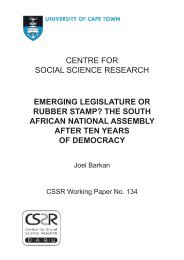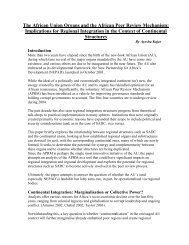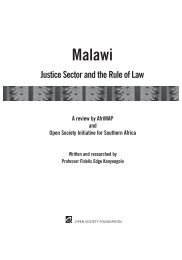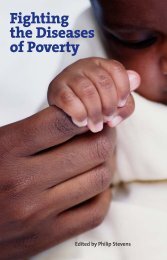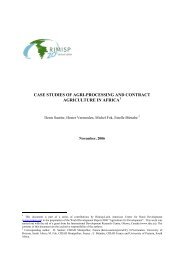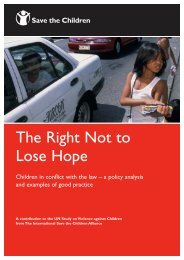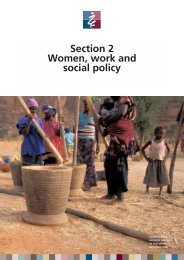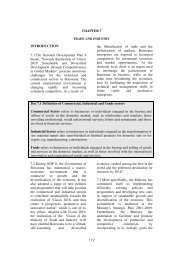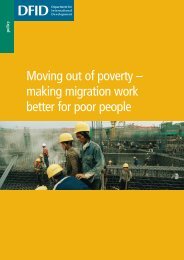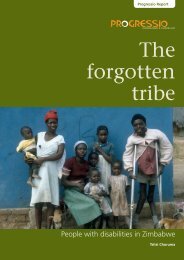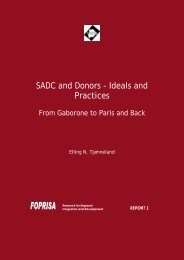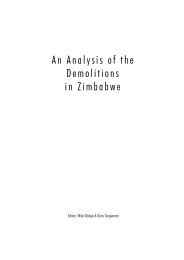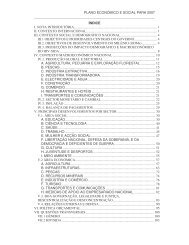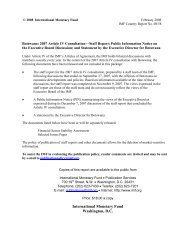Report of the National Conference: Women's Property Rights ... - FAO
Report of the National Conference: Women's Property Rights ... - FAO
Report of the National Conference: Women's Property Rights ... - FAO
You also want an ePaper? Increase the reach of your titles
YUMPU automatically turns print PDFs into web optimized ePapers that Google loves.
Women’s Land and <strong>Property</strong> <strong>Rights</strong> – A Global PerspectiveOpening Address by Robin Palmer, Global Land Adviser, Oxfam GBIntroductionI am both pleased and honoured to be here today. But also deeply disappointed because itshould be Kaori Izumi <strong>of</strong> <strong>FAO</strong> standing before you ra<strong>the</strong>r than I.Kaori, as many <strong>of</strong> you here will know, has worked tirelessly on <strong>the</strong> issues <strong>of</strong> women’sland and property rights in Sou<strong>the</strong>rn and Eastern Africa over many years, and it is largelydue to her passionate commitment and energy that important meetings such as this and<strong>the</strong> o<strong>the</strong>rs that have preceded it have taken place. With enormous energy she has helpedindividuals and organisations; she has galvanised <strong>the</strong> energies <strong>of</strong> her own organisationand that <strong>of</strong> o<strong>the</strong>rs, including my own; she has mobilised donors, and lobbied governmentsand o<strong>the</strong>rs at many levels in a tireless pursuit for justice for women’s rights, andparticularly for <strong>the</strong> rights <strong>of</strong> those women who have suffered manifold discrimination as aconsequence <strong>of</strong> <strong>the</strong> HIV/AIDS pandemic, which has so traumatised Sou<strong>the</strong>rn and EasternAfrica.‘Kaori’s T-shirt’, as Sibongile Ndashe, from <strong>the</strong> Women’s Legal; Centre in Cape Town,described it to me last week – this wonderful design from <strong>the</strong> workshop in Zimbabwe inDecember 2004 – has drawn many admirers. I have it posted on my desk at work, it is <strong>the</strong>screen saver on my computer, and I generally sleep in it on my travels! Colleaguesregularly admire it and its succinct message – ‘property and a piece <strong>of</strong> land give womenpeace <strong>of</strong> mind.’The issues which we shall be discussing over <strong>the</strong> next 3 days are hugely complex anddifficult <strong>the</strong> world over. There are no easy, painless, single solutions. If <strong>the</strong>re were, wewould not need to be here. They are complex because <strong>the</strong>y operate at so many differentlevels and so require responses at different levels. Most critically perhaps at <strong>the</strong> domesticlevel <strong>of</strong> <strong>the</strong> household, in <strong>the</strong> complex relationships between women and men, and also at<strong>the</strong> level <strong>of</strong> ‘traditional’ institutions. Someone once wrote that gender struggles are evenmore difficult than class struggles because, unlike women and men, <strong>the</strong> capitalist and <strong>the</strong>worker did not normally live under <strong>the</strong> same ro<strong>of</strong>!Before talking about global perspectives, I want to say 3 things.• First, what you are facing in Zambia, and elsewhere, is in reality a growingemergency that requires emergency attention.• Second, having acknowledged this, <strong>the</strong>re is a major challenge to accept that manytraditional attitudes and customs that may once have been appropriate, are nowhighly inappropriate and need to change, and change rapidly, in <strong>the</strong> new realitiesresulting from HIV/AIDS.39



